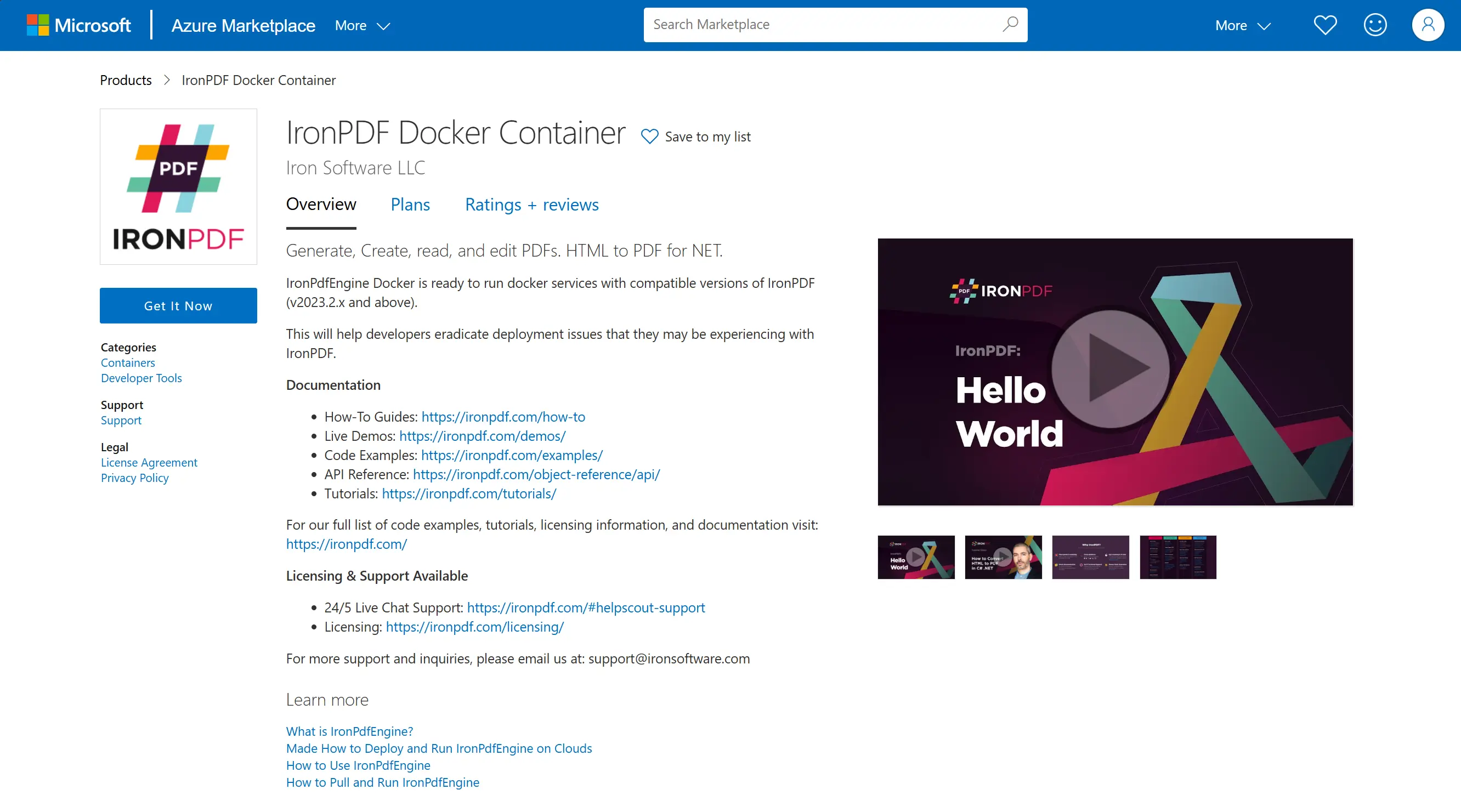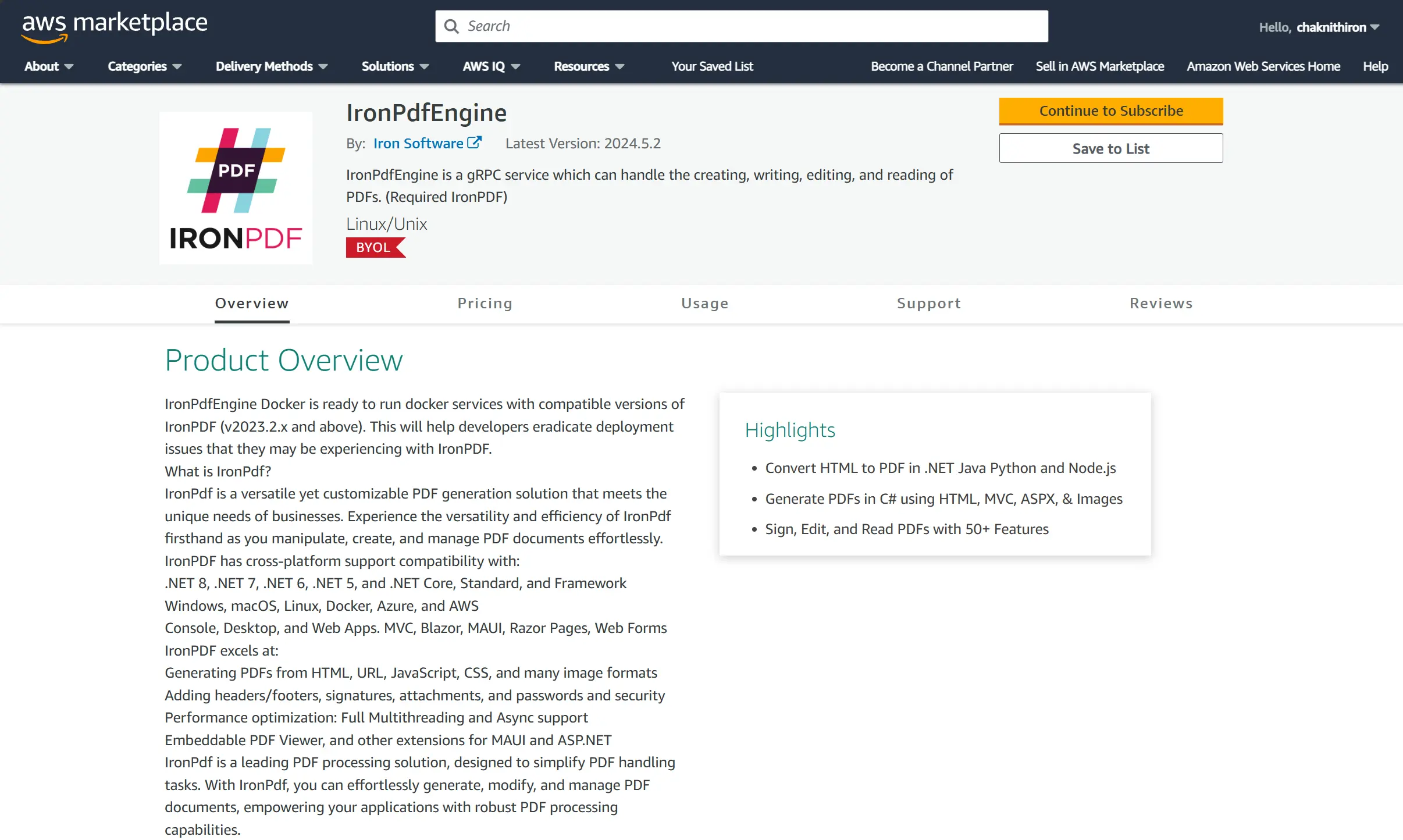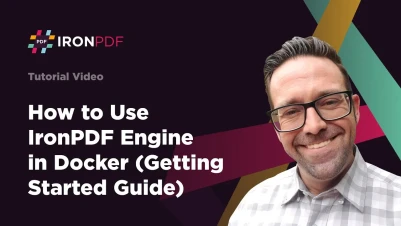
Run IronPDF as a Remote Container
The IronPdfEngine is a standalone service which can handle the creating, writing, editing, and reading of PDFs. IronPDF Docker is ready to run docker services with compatible versions of IronPDF (v2023.2.x and above). This will help developers eradicate deployment issues that they may be experiencing with IronPDF.
Why running IronPDF as its own container is a good idea
IronPDF requires both Chrome and Pdfium binaries in order to operate which are huge in file size (hundreds of MBs). It also requires several dependencies to be installed on the machine.
By using this method, your client will only take up a fraction of the size (in MB).
Avoid Deployment Issues
It can be challenging to configure the environment/container to include all dependencies properly. Using the IronPDF Docker container means that IronPDF comes pre-installed and guaranteed to work, avoiding all deployment and dependency headaches.
Versions
The IronPDF Docker tag is based on the version of IronPdfEngine itself. It is not the same version as the IronPDF product.
Each IronPDF version will have its own associated IronPdfEngine version. The version number must match the IronPDF Docker version.
For example, IronPDF for Java version 2023.2.1 requires IronPdfEngine version 2023.2.1. You cannot use mismatched IronPdfEngine and IronPDF versions.
How to use IronPDF Docker
Install IronPDF
Add the IronPdf.Slim Nuget package to your project.
https://www.nuget.org/packages/IronPdf.Slim/
Note: IronPdf, IronPdf.Linux and IronPdf.MacOs packages all contain IronPdf.Slim.
To reduce your application size, we recommend installing just IronPdf.Slim. Package IronPdf.Native.Chrome.xxx is no longer used, so you can remove it from your project.
Determine Required Container Version
By default, the IronPDF for Docker version will match the current version of IronPDF on NuGet. You may use the code below to check the version manually:
:path=/static-assets/pdf/content-code-examples/how-to/ironpdfengine-docker-version.csstring ironPdfEngineVersion = IronPdf.Installation.IronPdfEngineVersion;Setup IronPDF for Docker Container
Without Docker Compose
Run the docker container using the version from the previous step.
- Docker must be installed.
Setup
- Go to https://hub.docker.com/r/ironsoftwareofficial/ironpdfengine
- Pull the latest ironsoftwareofficial/ironpdfengine image
docker pull ironsoftwareofficial/ironpdfenginedocker pull ironsoftwareofficial/ironpdfengineOr pull the specific version (recommended)
docker pull ironsoftwareofficial/ironpdfengine:2025.3.6docker pull ironsoftwareofficial/ironpdfengine:2025.3.6- Run the ironsoftwareofficial/ironpdfengine container.
This command will create a container and run it in the background with port 33350
docker run -d -p 33350:33350 -e IRONPDF_ENGINE_LICENSE_KEY=MY_LICENSE_KEY ironsoftwareofficial/ironpdfengine:2025.3.6docker run -d -p 33350:33350 -e IRONPDF_ENGINE_LICENSE_KEY=MY_LICENSE_KEY ironsoftwareofficial/ironpdfengine:2025.3.6With Docker Compose
The key is to set up a Docker network that allows IronPdfEngine and your application to see each other. Set 'depends_on' to ensure that IronPdfEngine is up before your application starts.
Setup
- Start by creating a
docker-compose.ymlfile. Set up your Docker Compose file using the following template:
version: '3.6'
services:
myironpdfengine:
container_name: ironpdfengine
image: ironsoftwareofficial/ironpdfengine:latest
ports:
- '33350:33350'
networks:
- ironpdf-network
myconsoleapp:
container_name: myconsoleapp
build:
# enter YOUR project directory path here
context: ./MyConsoleApp/
# enter YOUR dockerfile name here, relative to project directory
dockerfile: Dockerfile
networks:
- ironpdf-network
depends_on:
myironpdfengine:
condition: service_started
networks:
ironpdf-network:
driver: 'bridge'- Set the address of IronPdfEngine inside your application (myconsoleapp) to "myironpdfengine:33350"
- Run docker compose
docker compose up --detach --force-recreate --remove-orphans --timestampsdocker compose up --detach --force-recreate --remove-orphans --timestampsConnect to IronPdfEngine
Run your IronPDF code; your app now communicates with the IronPdfEngine in Docker!
:path=/static-assets/pdf/content-code-examples/how-to/ironpdfengine-docker-use.csusing IronPdf;
using IronPdf.GrpcLayer;
// Configure for Docker container
var config = IronPdfConnectionConfiguration.Docker;
config.Host = "localhost";
IronPdf.Installation.ConnectToIronPdfHost(config);
// Use IronPDF
ChromePdfRenderer renderer = new ChromePdfRenderer();
PdfDocument pdf = renderer.RenderHtmlAsPdf("<h1>Hello IronPDF Docker!<h1>");
pdf.SaveAs("ironpdf.pdf");Connection Type
There are several IronPdfConnectionType that you can assign depending on the connection type you wish to make.
Here's a list of available properties:
LocalExcutable: To connect to an IronPdfEngine "server" running an executable on your local machine, we use this option. A quick example would be a WinForm invoicing application that generates PDFs locally without relying on cloud services.
Docker: This option should be used when trying to connect to a Docker container either locally or in the cloud.
RemoteServer: This option is used for IronPdfEngine in the cloud. This connects to a cloud-hosted (e.g., Docker) IronPdfEngine instance through the HTTP or HTTPS protocol. Note that, since this is connecting to a remote server, the full URL is required (including the HTTP or HTTPS protocol).
Custom: For full control and customization over the connection, you can use this option. This option uses your custom-defined Grpc.Core.ChannelBase instead of the other defined options from above. Developers can create a new channel by either creating a new Grpc.Core.Channel object or using Grpc.Net.Client.GrpcChannel.ForAddress(System.String) to custom and complete control over the gRPC channel.
.NET Framework with NetFrameworkChannel
For .NET Framework, we require a different setup because gRPC works differently in .NET Framework projects. For this method to work, please ensure the Grpc.Core NuGet package is installed. We'll be using a custom gRPC channel derived from Grpc.Core.ChannelBase for this specific setup.
Let's examine this example, where we'll implement the connection channel to create and save a PDF using IronPDFEngine.
<http> or <https> prefix in the address.pdf.Dispose is required in this case.:path=/static-assets/pdf/content-code-examples/how-to/ironpdfengine-docker-use-grpc.csusing IronPdf;
// This code demonstrates how to use IronPdf with gRPC in a .NET Framework application.
// 1. Configure connection to use local IronPdfEngine executable
var config = IronPdf.GrpcLayer.IronPdfConnectionConfiguration.Executable;
// 2. Connect to the IronPDF host with the executable configuration
IronPdf.Installation.ConnectToIronPdfHost(config);
// 3. Create a PDF renderer instance
ChromePdfRenderer renderer = new ChromePdfRenderer();
// 4. Render HTML string as PDF document
PdfDocument pdf = renderer.RenderHtmlAsPdf("Hello world");
// 5. Save the PDF to disk
pdf.SaveAs("output.pdf");
// 6. Clean up , this is needed to work
pdf.Dispose();Alternative method with WithCustomChannel
An alternative method would be to utilize the WithCustomChannel method provided by the IronPdf.GrpcLayer.
The WithCustomChannel takes in two parameters, the customChannel, which is your custom gRPC channel, and metadata. The metadata parameter is optional and is set to null by default.
:path=/static-assets/pdf/content-code-examples/how-to/ironpdfengine-docker-use-grpc-alt.csusing IronPdf;
using IronPdf.GrpcLayer;
using Grpc.Core;
// 1. Create custom gRPC channel (.NET Framework style)
var channel = new Channel("123.456.7.8:80", ChannelCredentials.SecureSsl);
// 2. (Optional) Add metadata headers if needed
var metadata = new Metadata
{
{ "Authorization", "Bearer your_token_here" }
};
// 3. Configure IronPDF with custom channel
var config = IronPdfConnectionConfiguration.WithCustomChannel(channel, metadata);
IronPdf.Installation.ConnectToIronPdfHost(config);
// 4. Generate PDF
var renderer = new ChromePdfRenderer();
PdfDocument pdf = renderer.RenderHtmlAsPdf("Hello world");
// 5. Save the PDF to disk
pdf.SaveAs("output.pdf");
// 6. Clean up , this is needed to work
pdf.Dispose();Deploy IronPdfEngine on AWS ECS
Prerequisites
- Pull the IronPdfEngine Docker image. This is in the Setup IronPDF for Docker Container above.
- An AWS account with access to ECS.
Setup
- Create an ECS Cluster. Follow this guide to create a cluster for the Fargate and External launch types using the console.
- Create a task definition. Follow this guide for creating a task definition using the console.
Recommended settings:
- AWS Fargate
- A minimum 1 vCPU with 2 GB of RAM is recommended. Depending on your workload, if you are working with PDFs containing more than 10 pages or experiencing heavy load requests, please select a higher tier.
- Network mode: awsvpc
- Port mappings:
{ "containerPort": 33350, "hostPort": 33350, "protocol": "tcp", "appProtocol": "grpc" } - Image URI: point to any IronPdfEngine from us. For example, "ironsoftwareofficial/ironpdfengine:2024.1.20" (from DockerHub)
- AWS Permission & Networking are on your own
- Enable Amazon CloudWatch is recommended. (Enable logging)
- Container startup order is necessary if you want to deploy your application container in the same task definition.
- Run a task definition. You could run a task definition as a Task or Service. Follow this guide on creating a service using the console.
Recommended settings:
- Launch type: AWS Fargate
- Public IP: Turned on for test and Turned off for production. Security and AWS Networking are on your own.
- Enjoy! IronPdfEngine docker is up and running in your AWS!
Deploy IronPdfEngine on Azure Container Instances
Prerequisites
- Pull the IronPdfEngine Docker image. This is in the Setup IronPDF for Docker Container above.
- Azure Account
Setup
- Create an Azure Container. Follow this quickstart guide on deploying a container instance in Azure using the Azure portal.
Recommended settings:
- Image source: Other registry
- Image: ironsoftwareofficial/ironpdfengine:2024.1.20 (from Docker Hub)
- OS type: Linux
- Size: Minimum of 1 vCPU and 2 GiB of memory, or higher
- Port: TCP Port 33350
- Enjoy! IronPdfEngine docker is up and running in your Azure Container Instances!
Getting IronPdfEngine in AWS ECR Public Gallery
Prerequisite
- Docker must be installed.
Setup
- Go to https://gallery.ecr.aws/v1m9w8y1/ironpdfengine
- Pull the v1m9w8y1/ironpdfengine image
docker pull https://gallery.ecr.aws/v1m9w8y1/ironpdfenginedocker pull https://gallery.ecr.aws/v1m9w8y1/ironpdfengineOr pull the specific version (recommended)
docker pull https://gallery.ecr.aws/v1m9w8y1/ironpdfengine:2023.12.6docker pull https://gallery.ecr.aws/v1m9w8y1/ironpdfengine:2023.12.6- Run ironpdfengine container.
This command will create a container and run it in the background with port 33350
docker run -d -p 33350:33350 ironsoftwareofficial/ironpdfenginedocker run -d -p 33350:33350 ironsoftwareofficial/ironpdfengineLearn how to configure the IronPdf client to utilize IronPdfEngine by navigating to the section "Update the Code to Use IronPdfEngine."
Get IronPdfEngine from the Marketplace
To help you get started quickly, we have set up IronPdfEngine on both the Azure and AWS Marketplaces.
Azure Marketplace
Setup
- Go to IronPDF Docker Container on Azure Marketplace. Click on the "Get It Now" and "Continue."
- Complete the "Basics", "Cluster Details", and "Application Details" to create the Kubernetes service.
- Once the deployment has completed, navigate to the left sidebar and select Kubernetes resources> Run command. Run the following command:
kubectl get serviceskubectl get services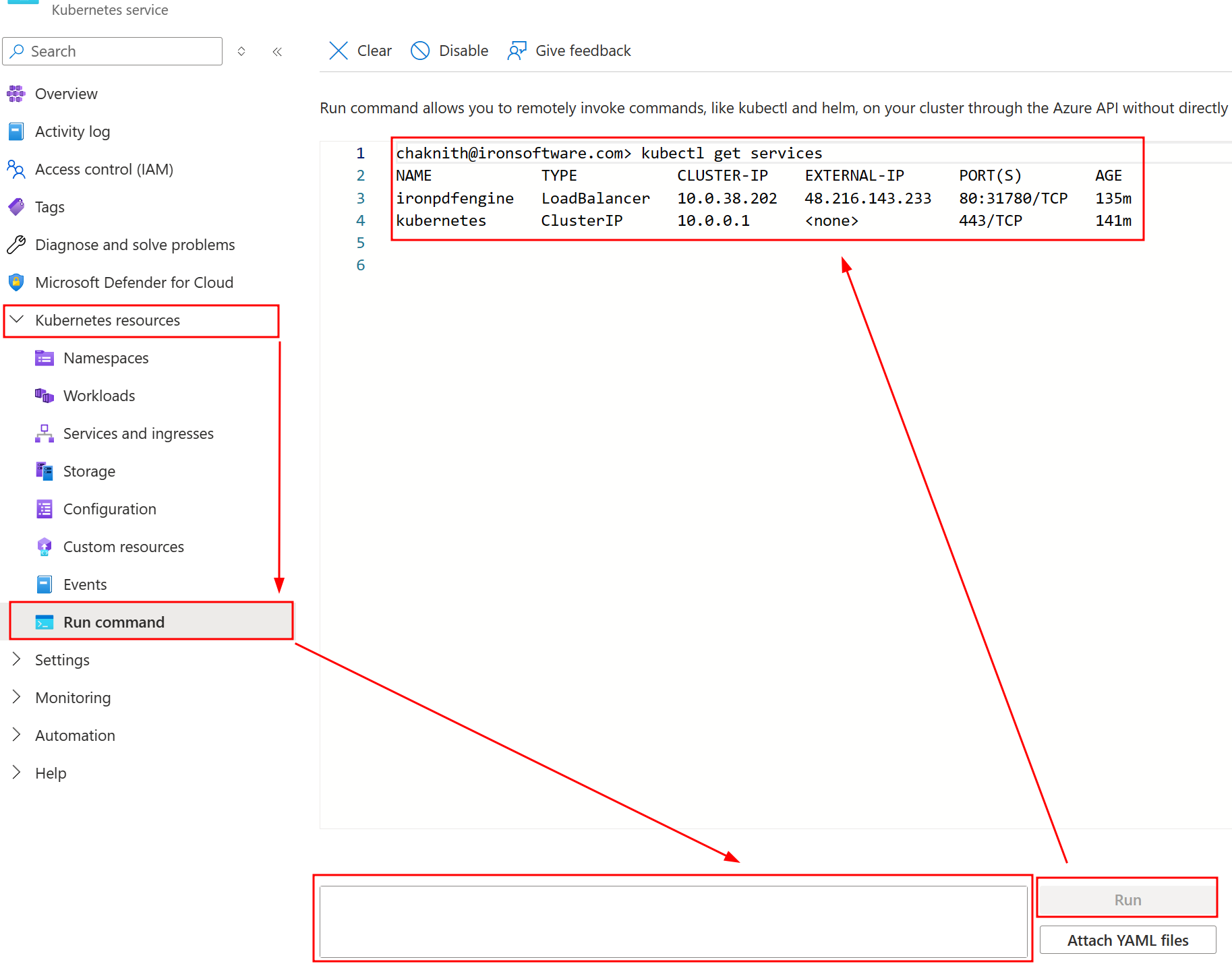
With the information of EXTERNAL-IP and PORT(S), you can configure the IronPDFEngine connection accordingly.
:path=/static-assets/pdf/content-code-examples/how-to/pull-run-ironpdfengine-azure-marketplace.csusing IronPdf;
using IronPdf.GrpcLayer;
IronPdf.License.LicenseKey = "IRONPDF-MYLICENSE-KEY-1EF01";
IronPdfConnectionConfiguration configuration = new IronPdfConnectionConfiguration();
configuration.ConnectionType = IronPdfConnectionType.RemoteServer;
configuration.Host = "http://48.216.143.233";
configuration.Port = 80;
IronPdf.Installation.ConnectToIronPdfHost(configuration);
ChromePdfRenderer renderer = new ChromePdfRenderer();
PdfDocument pdf = renderer.RenderHtmlAsPdf("<h1>testing</h1>");
pdf.SaveAs("output.pdf");AWS Marketplace
Prerequisites
- Docker must be installed.
- AWS CLI must be installed and logged in.
Setup
Go to IronPdfEngine on AWS marketplace. Click on the 'Continue to Subscribe.'
- Accept the Terms.
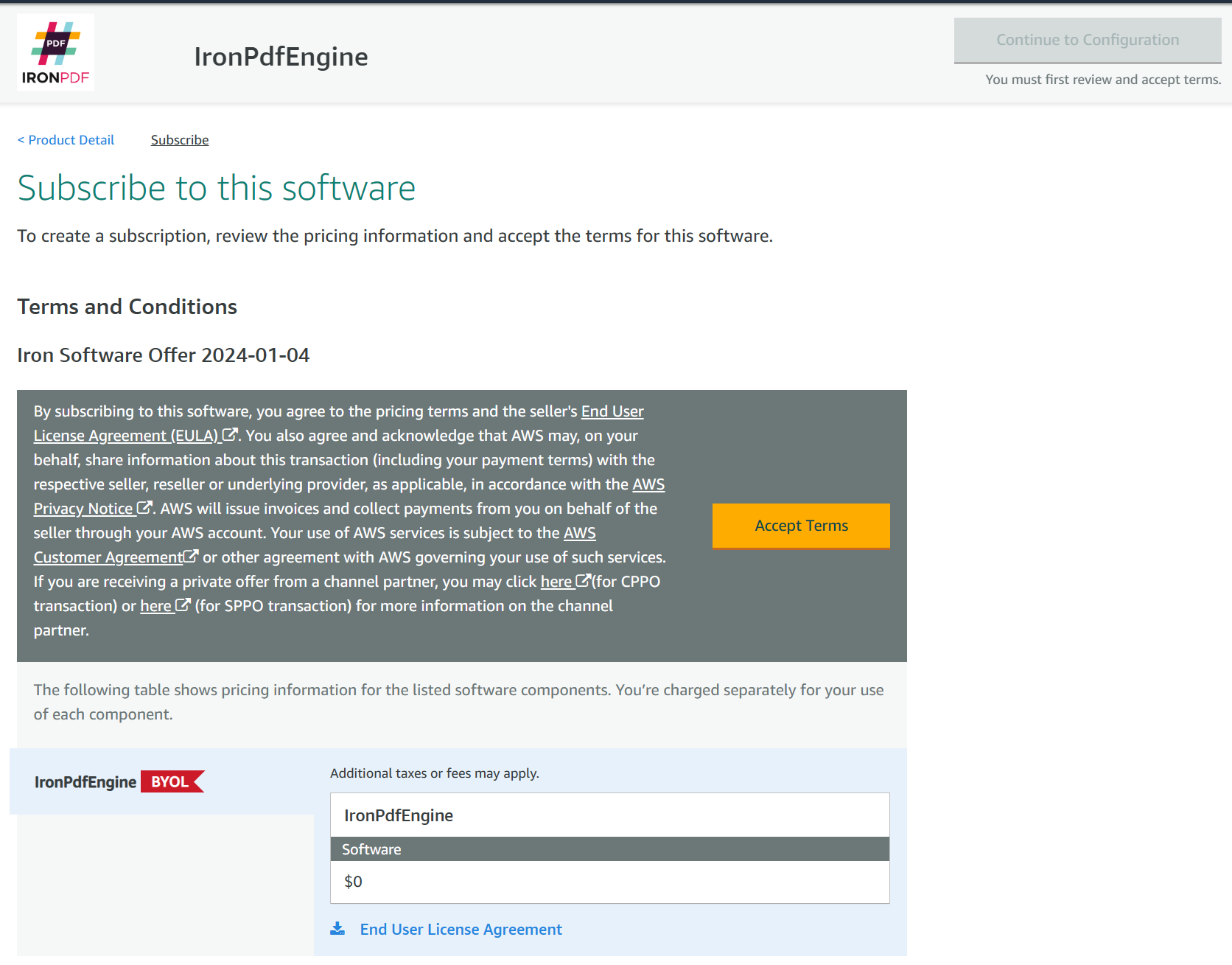
- Continue to Configuration.
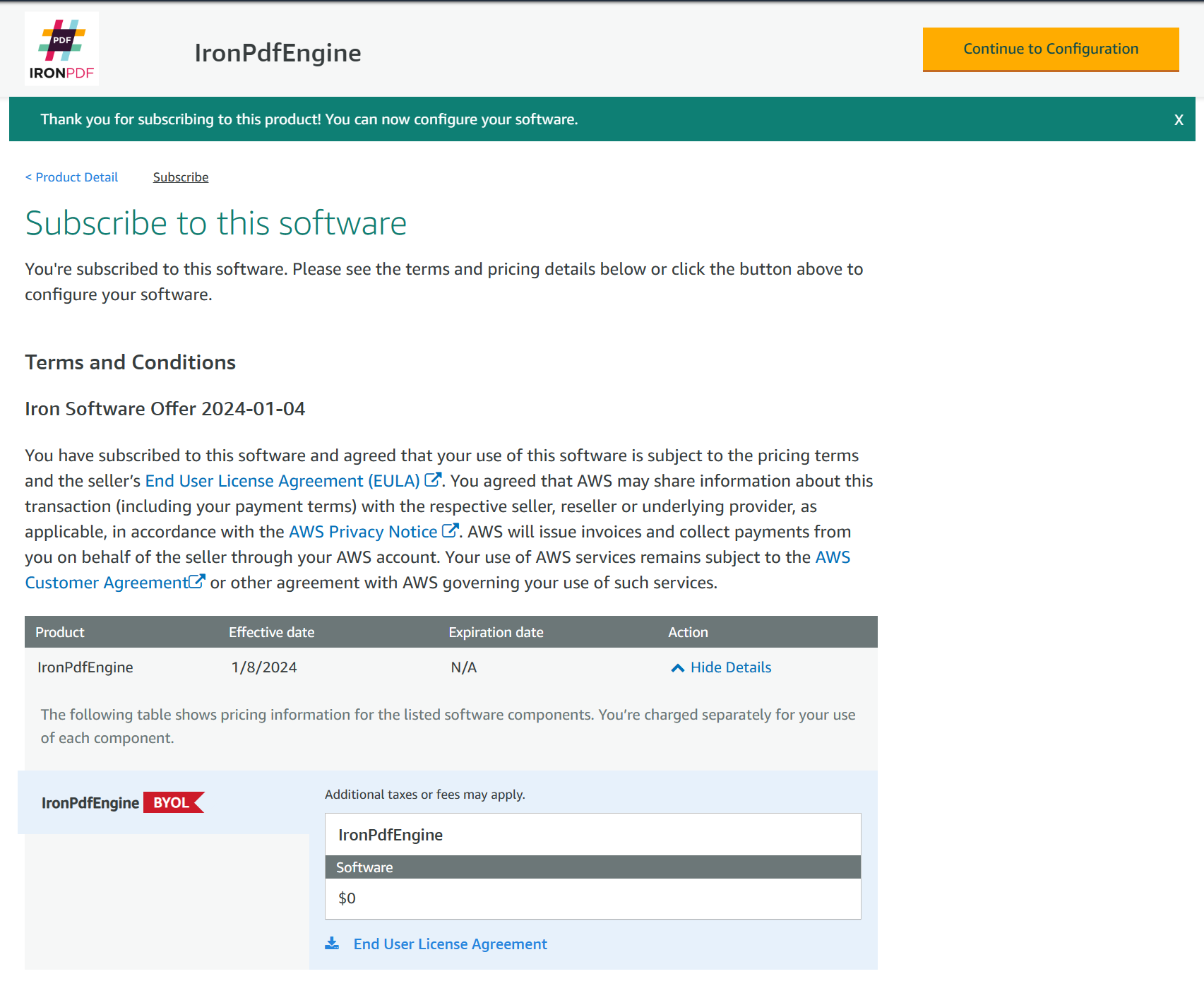
- Pull the ironpdfengine image. This step will show you a command to pull the ironpdfengine image.
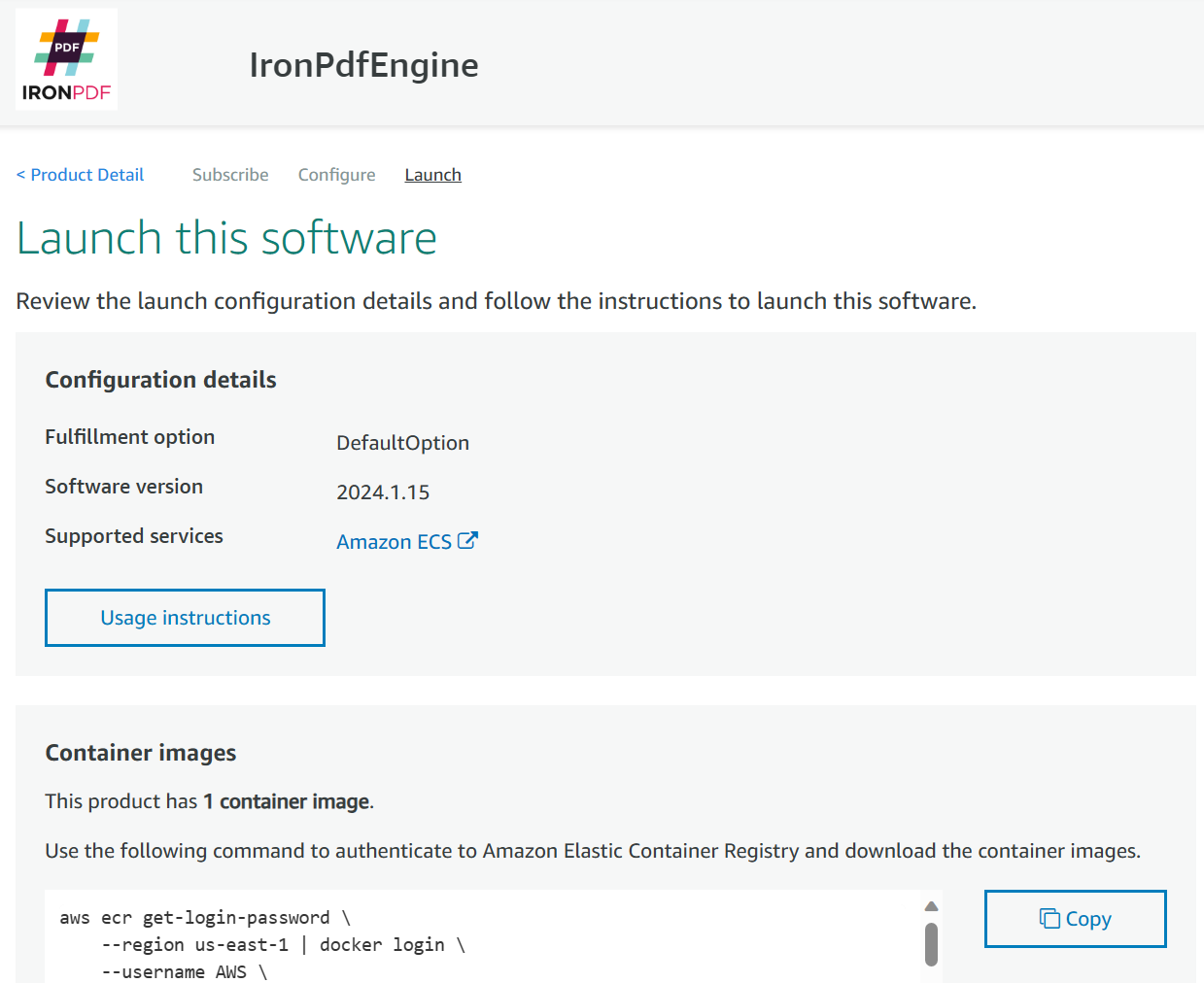
For Example:
aws ecr get-login-password \
--region us-east-1 | docker login \
--username AWS \
--password-stdin 000000000000.dkr.ecr.us-east-1.amazonaws.com
CONTAINER_IMAGES="000000000000.dkr.ecr.us-east-1.amazonaws.com/iron-software/ironpdfengine:2024.1.15"
for i in $(echo $CONTAINER_IMAGES | sed "s/,/ /g"); do docker pull $i; doneaws ecr get-login-password \
--region us-east-1 | docker login \
--username AWS \
--password-stdin 000000000000.dkr.ecr.us-east-1.amazonaws.com
CONTAINER_IMAGES="000000000000.dkr.ecr.us-east-1.amazonaws.com/iron-software/ironpdfengine:2024.1.15"
for i in $(echo $CONTAINER_IMAGES | sed "s/,/ /g"); do docker pull $i; done- Run the ironpdfengine container. This command will create a container and run it in the background with port 33350.
docker run -d -p 33350:33350 000000000000.dkr.ecr.us-east-1.amazonaws.com/iron-software/ironpdfengine:2024.1.15docker run -d -p 33350:33350 000000000000.dkr.ecr.us-east-1.amazonaws.com/iron-software/ironpdfengine:2024.1.15Health Check For IronPdfEngine
Checking on the health of your Docker Container is crucial for ensuring reliability and availability in a production environment. The ability to check for the IronPdfEngine Docker container allows developers to restart the service if it fails, as well as scale resources if the demand increases, along with monitoring a continuous application.
To check on the health of your IronPdfEngine, we can send a gRPC request to the same IronPdfEngine port (by default, it would be 33350) to verify if we get a response.
Health Check with gRPC
IronPdfEngine adheres to the standard gRPC health check pattern, utilizing the following protocol structure.
message HealthCheckRequest {
string service = 1; // Name of the service to check (e.g., "IronPdfEngine")
}Since we're checking for IronPdfEngine, we replace the service name with IronPdfEngine.
Here's an example using JavaScript with Postman to send a gRPC request to the local IronPdfEngine service with the default number of 33350.
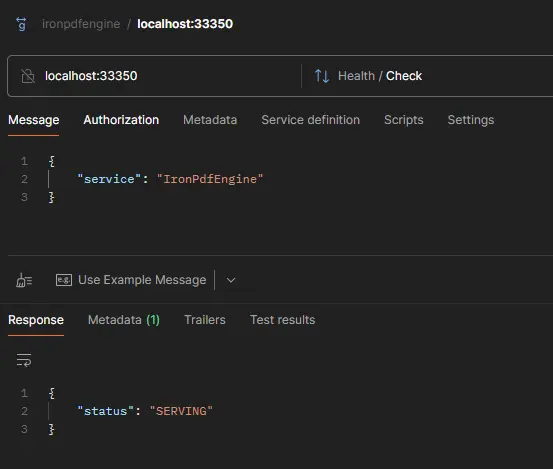
As you can see from the response, the status response is SERVING, indicating the service is up and running. If the container is not healthy, the status response would be NOT_SERVING.
Health Check with Kubernetes Setup
For Kubernetes setups, we can use the following to check whether the service is healthy or not.
livenessProbe:
exec:
command:
- /bin/grpc_health_probe
- -addr=:33350
- -rpc-timeout=5s livenessProbe:
exec:
command:
- /bin/grpc_health_probe
- -addr=:33350
- -rpc-timeout=5sFrequently Asked Questions
How can I convert HTML to PDF in C# using Docker?
You can use IronPDF's Docker setup to convert HTML to PDF in C#. Deploy IronPdfEngine in a Docker container and use methods like RenderHtmlAsPdf to achieve this.
What are the benefits of using IronPdfEngine in Docker?
Using IronPdfEngine in Docker offers a pre-installed and reliable environment, reducing dependency issues and ensuring that all necessary components, like Chrome and Pdfium binaries, are available.
How do I set up IronPdfEngine with Docker Compose?
Create a docker-compose.yml file and define the services and networks. Ensure IronPdfEngine starts before your application by using the depends_on directive.
What steps are required to deploy IronPdfEngine on AWS ECS?
To deploy on AWS ECS, create an ECS Cluster, define a task definition, and use AWS Fargate for resource allocations. Then, run your task or service to launch IronPdfEngine.
How can I pull IronPdfEngine from the AWS ECR Public Gallery?
Access the AWS ECR Public Gallery, find the IronPdfEngine image, and follow the provided commands to pull and run the container.
Is it possible to use IronPdfEngine from the Azure Marketplace?
Yes, IronPdfEngine is available on the Azure Marketplace. You can follow the setup instructions on the Marketplace page to deploy the Docker container.
What limitations should I be aware of when using IronPdfEngine?
IronPdfEngine does not support horizontal scaling. It's essential to consider this limitation when planning your deployment to ensure it meets your application's needs.
How can I efficiently handle PDF generation and manipulation tasks with Docker?
Deploy IronPdfEngine in a Docker container to efficiently manage PDF generation and manipulation tasks, leveraging Docker's capabilities to handle dependencies and ensure a consistent environment.
What are the requirements for deploying IronPdfEngine on Azure Container Instances?
To deploy on Azure Container Instances, ensure you have an Azure account and pull the IronPdfEngine Docker image for deployment.


